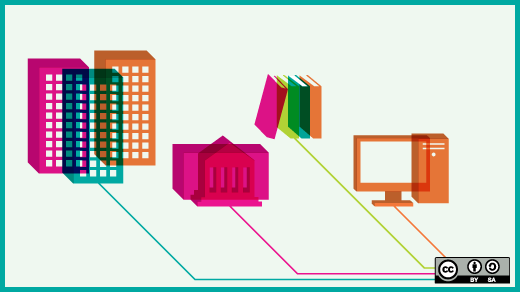The TYPO3 CMS project has a long history as open source project, with its foundation going back as far as 1997 when it was initially developed by Danish Kasper Skårhøj. Currently, the TYPO3 project has a solid foundation in Europe. Large cooperations like Deutsche Bank, Airbus, Air France, as well as, universities and non-governmental organizations like Food and Agriculture Organization, Greenpeace, and Organisation for the Prohibition of Chemical Weapons run on the TYPO3 CMS.
The TYPO3 project has been innovating and stretching their boundaries and the community has developed a PHP framework called TYPO3 Flow, which is the basis for the new CMS, Neos. Neos is challenging the future of content management with a fresh look at how editors work and a plethora of publishing channels (offline and online). TYPO3gem (TYPO3 gemeenten in Dutch), or TYPO3 municipalities, is another arm of the project. As a cooperation of almost 50 municipalities, this group develops, maintains, implements, and shares experiences around the TYPO3 CMS. The developement of Neos is being closely watched as well and may be adopted by other municipalities.
The chairman of TYPO3gem, Bart Lindeboom, tells me that they celebrated five years of cooperation last year, in 2013. And, it seems their future is based on open source more than ever. He remarks that cooperation and sharing are at the very heart of a community were published in the booklet for the anniversary celebration. And, TYPO3gem recently changed their bylaws to allow for the use of a growing variety of open source initiatives.
Bart says, "All around us we see growing municipal communities forming around open source products that have an overlap with each other."
It all got started in 2007 when the local municipality of Houten, a town in the Netherlands, began searching for a CMS. TYPO3 CMS was already in use by a number of other Dutch municipalities, so the municipality of Houten advised their city council that they would like to adopt it as well, but that the success of implementation would be strongly dependent on other municipalities joining in and using it as well.
The message got through, and a year later this group of municipalities is working together to train and educate each other, as well as, sharing all functional extensions back to TYPO3 CMS community.
I met with chairman Bart Lindeboom and asked him about this unique cooperation and use of an open source content management system in local government. Bart also heads the Information Communication and Technology (ICT) department of the municipality of Ede. There he leads the use of numerous open source products, helping the municipality of Ede to spend 92% less on software than most.

What has TYPO3gem achieved through cooperation?
We have achieved huge promotion for TYPO3 CMS as municipal option. We have wonderful cooperation between municipalities pertaining to the selection process, education, architectural decisions, development; and along with that, attention for important topics like accessibility guidelines, hosting, forms, and security.
What is the significance of TYPO3gem in relationship to the TYPO3 project?
TYPO3gem is a solid promoter of TYPO3 as a CMS. Without our group the market share of TYPO3 would be significantly lower. Furthermore, our members and users are contributing to the further development of of the project, and we are a member of the TYPO3 association. The Dutch TYPO3 congress is partly sponsored by TYPO3gem, and a considerable amount of its members come from within those ranks.
In what way do the members of TYPO3gem develop generic tools and extensions for the project?
What is being developed is quite specific for the municipal market, product and services modules, customer contact centre, and conference systems. Within the association the members look for co-funders of what they wish to be developed. Sometimes only a few municipalities cooperate on this, but sometimes as many as 10 municipalities join in the effort. The way funding is divided among the partners can vary, sometimes everyone funds an equal amount, and sometimes, for example, contributions are based on number of inhabitants. Usually this process happens in a very natural and pleasant way.
The motto of the TYPO3 project is: Inspiring People to Share. This very clearly indicates the open source nature of that project. What does this mean to municipalities? Does this extend beyond the software?
We have a principle agreement that whatever is built must end up in the TYPO3 Extension Repository for all to use. So regardless of how a project is funded, we maintain the principle of sharing. But, we take it one step further. For example, what comes to mind are tender documents, design, navigation structure, and course material being shared in the group. The members are not shy when it comes to mentioning they experience the cooperation as inspiring.
The Dutch government shows a clear preference for open source software by means of the 'comply or explain' principle. Do we indeed see more use of open source at municipalities? What are good examples of that?
For content management systems, the choice is clearly open source. No discussions there. The market share of open source is seeing a steady rise. Linux has also conquered a steady position. From the broad perspective, progress is slow and municipalities easily get cold feet. The question is whether or not the smaller municipalities can handle the administration of such a hybrid environment, which might be no problem in the long run as cooperation between the smaller municipalities is increasingly prevalent.
Newcomer zaaksysteem is gaining ground rapidly. There is a lot of interest for what is happening in the municipality of Ede. Ede for instance already uses LibreOffice, Zarafa (a Microsoft Exchange alternative, including webmail), Firefox web browser, TYPO3, zaaksysteem.nl, MySQL and PostgreSQL databases, Nagios network monitoring software, and the Asterisk Voice Over IP solution.
I continue to hope that there will be more pressure from The Hague, the seat of government in the Netherlands. I cannot understand why municipalities are not forced to use LibreOffice or that municipalities together use PostgresSQL as dbms for their key applications. What will bring some pressure to this whole situation, though, is the economic situation; all municipalities experience budget cuts and there is no denying that using open source products relieves the pain in that area. At the same time it provides stimulus for the national economy.
What are the future plans for TYPO3gem?
We foresee growth. Over 10% of Dutch municipalities use TYPO3, and that percentage is on the rise. Furthermore, we are investigating the possibilities to shift into a kind of OSSgem where TYPO3gem is a subdivision of OSSgem.
We will be working on these plans this year. Our knowledge and working formula can be used in a broader sense then only stimulating TYPO3. We are for instance thinking of LibreOffice, zaaksysteem.nl, and Zarafa. A solid community can help these open source products make a real breakthrough.
TYPO3gem has already made the move to support other open source products by adopting a form toolkit that has its own user association and operates under the wings of TYPO3gem. With its current experience, TYPO3gem overlooks, under assignment of the Dutch Association of Municipalities (VNG), progress on that toolkit along with aspects like security, accessibility guidelines, and organisational aspects.






Comments are closed.